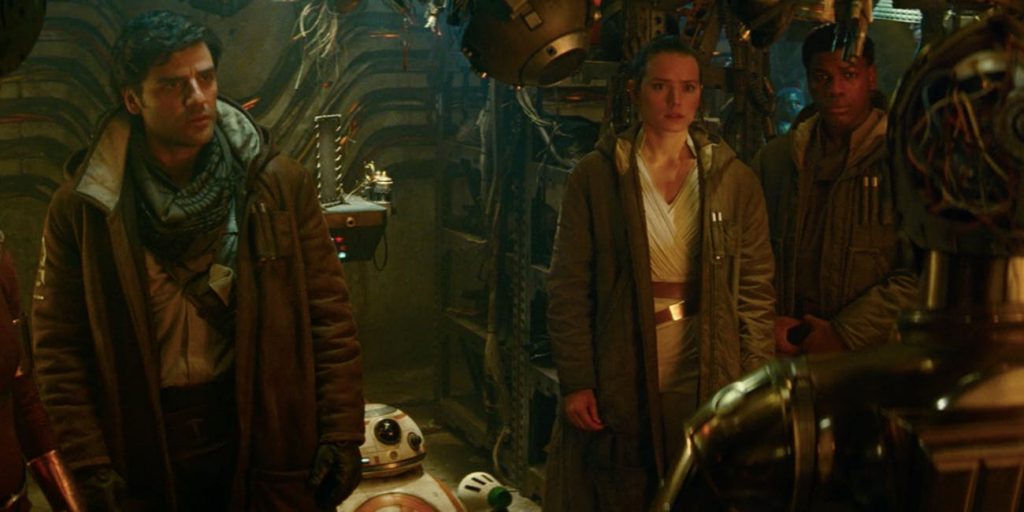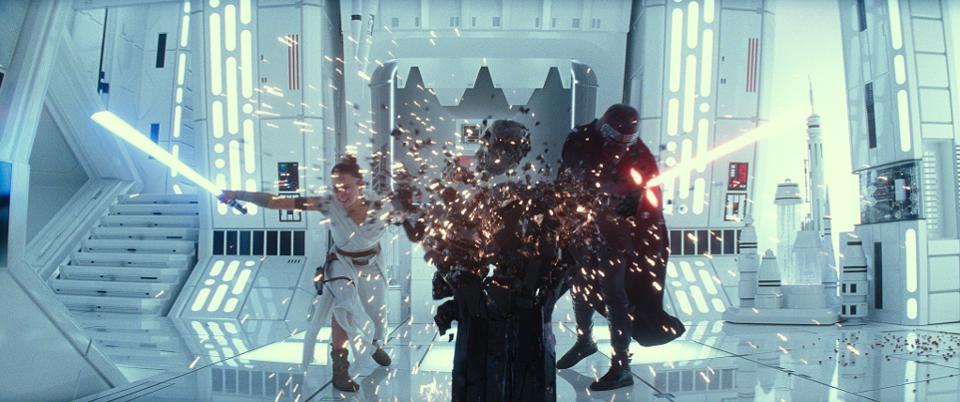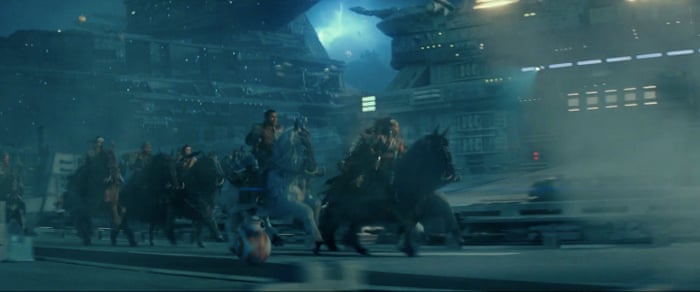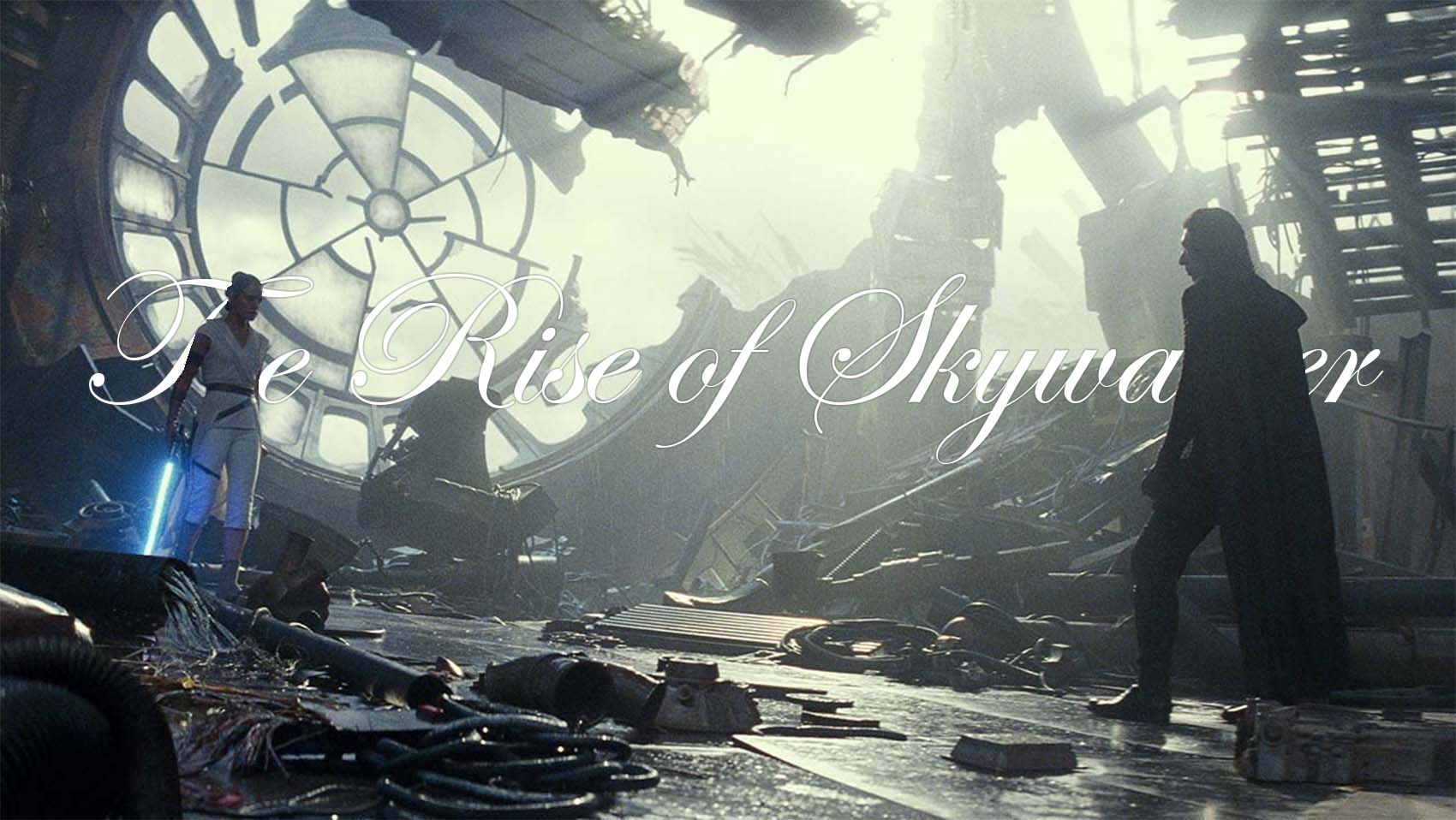I love small movies. I love it when some friends get together, craft a decent screenplay, and pour their hearts and souls into their film. Movies like They Look Like People, where Perry Blackshear paid a few actor friends of his to join him, and in the meantime, drafted a screenplay on the fly because he knew his other screenplay was way too big of a movie to make. And his friends (MacLeod Andrews, Evan Dumouchel, Margaret Ying Drake) were up to the challenge…and They Look Like People was crafted. And yet, here I am, talking about Rise of Skywalker and it is literally 180 degrees away from this kind of story making. And that is why, today, I am bringing to you, a totally biased Rise of Skywalker think piece – I plan to explain the various cultural phenomena happening inside of Star Wars that made this movie what it is.
First, some housekeeping. I will not be posting spoilers in this discussion – but I’m totally open to us discussing the ins and outs of the movie spoilers in the comments section. So if you haven’t seen the film yet, please duck and weave your way away from the comments. OK? Great.
I’m going to start off with a bang – Star Wars was successful mainly because of George Lucas’ understanding of the struggle between heroes and villains that originally comes from old myths being told in new ways. Yes, yes, which was most clearly enunciated by Joseph Campbell. But the Star Wars saga has always been a story about a down on your luck, ragtag band of survivors, believing in something bigger than themselves. Hoping in something bigger than themselves. Human nature has a deep seeded desire to believe that they play a part in a story much much larger than themselves. Why? Because we are wired to hope, we are wired to believe that our stories matter. (And they do, but that is a different conversation for a different day.)
So when Lucas pulled from the Joseph Campbell playbook he was intentionally pulling from these mythos that mean so much to us. Good was good (white hats), and bad was bad (black hats…literally). We are mired in ambiguities throughout our everyday lives. Should I give five bucks to that guy on the street who is obviously down on his luck? First blush, it makes sense. But will he use it to fuel his alcoholism or his drug addiction? You know what I mean. For the evil to come color coded with Darth’s affixed to their titles, would be MARVELOUS. No? Should I consort with a Darth? No. Probably not. Or, should I take this job as an Under-Sith? No. I shouldn’t. Morally, it seems dubious. But today, the moral questions in my day to day life is anything but simple to understand.

“Well, when I did ‘Star Wars’ I consciously set about to recreate myths and the — and the classic mythological motifs. And I wanted to use those motifs to deal with issues that existed today.”
George Lucas
So what we have with Star Wars is a heralding back to King Arthur, and the Knights of the Round Table. We see a band of friends struggling to do the right thing. To come out from under the oppressive power of the Dark Side. To free people to live lives that matter…morally. But most importantly – I’ve said this before and I’ll say it again – it answers the question of whether or not we are all someone. Notice…Luke, a no one from a backwater planet that was made solely out of sand and armpit sweat, was revealed to be the son of the most powerful villain in all of filmic history, Darth Vader. Does his life have purpose and meaning? And what about Leia, the daughter of Darth Vader, has her adoptive planet (Alderaan) blown to smithereens, and her parents (Jimmy Smits, we love you) along with it. She’s an orphan twice! Does she belong? Does she have a family? Is her life meaningful among all this familial chaos? YES! She’s Princess Leia! She’s General Leia! And Rey? Who is she. The story so far, the story up to this point, is that she is literally no one. She has no parents that matter. They sold her for drug money. She’s nobody. (It isn’t a spoiler to say, of course that storyline couldn’t stand. This idea that we all have The Force, and even nobodies could be powerful is a DECIDEDLY STAR TREK idea. It literally makes zero sense within the Star Wars mythic universe. Of course she is someone important.)

The Star Wars Struggle of the Self
But all of the trappings of the Star Wars universe are nothing – literally zilch – minus the idea of the insidiously powerful internal struggle. Take the mythos of Star Wars, throw it in the nearest trash can. Take the Sith Lords, and the band of Rebels…trash can. Light Sabers, and X-Wing fighters…trash can. If you don’t have the Star Wars internal struggle of the opposites, you don’t have Star Wars.
In a New Hope, Luke knows he’s meant for something bigger. He stares up at the stars optimistically and pines for a storyline that means something bigger than himself. Something to abandon himself to. You see this in his attempts to proselytize his money grubbing buddy, Han Solo. But Luke’s story walks into darker waters with Empire Strikes Back. This optimistic kid hits the proverbial wall when he realizes his past, and what the real path forward actually is. It’s Frodo in the midst of The Two Towers. It’s Jon Snow standing alone on the White Wall. It’s King Arthur and the valley of his incestuous affair. Luke is lost in the valley of his own doubts. Can he overcome his evil past, his evil blood? Can he rewrite this story about himself that has already been written for him before he was born? Will he be able to stand against the tide, and refuse to buckle in the face of his own mental house of horrors?
Now THIS! This is a story that resounds. Daily we fight this battle. Every single day we logically weigh the pros and cons of giving that guy on the corner five bucks. Heck! Screw benevolency! Every day we struggle to keep from stealing that guy’s wallet!! Flipping that other driver off! Being the evil that we know that we can be. Star Wars is, 100%, this internal struggle. It is this pushing against this natural tide.
We would like to be able to say that we returned the wallet with the 100 million dollar lottery ticket inside. But would we return it? We would like to be able to be morally upright in all cases, and in all situations. But are we? NO! Which is why the battle of Star Wars isn’t in the Tie Fighters and the X-Wings. That is the window dressing. The real battle of Star Wars is always about either A) giving up hope, and joining the Dark Side, or B) Standing strong to our convictions and doing the right thing in spite of the odds. That is the heart of Star Wars. And it’s a struggle rooted in the extreme convictions of morality and hope. We are Luke. We are Leia. We are Rey. This is our story. Isn’t their story. Joseph Campbell’s comparative mythology book was entitled ‘The Hero with a Thousand Faces’ after all. It’s your face. It’s my face. We see ourselves in these dark situations, and something inside of us screams for us to do the right thing, the consequences be damned.
The Rise of Skywalker
But where does that leave us with The Rise of Skywalker? My quick blush on the film is that it is 100% dead center I would say. Rey’s internal struggle was there and her fight against the flip to the Darkside was a prominent feature of the film. Rey’s identity as special, (working hard not to spoil anything here) and her place in the pantheon of Star Wars’ heroes was 100% there. The clear definition of moral right and moral wrongs was all there. We see the Rebels working together to try and fight enormous odds that they literally have no chance of winning without hope outside of themselves.
But I can also see where more casual observers of the film might really have issues with this film. The first 45 minutes is literally coming at the audience at light speed. It’s literally tricky to stay on top of. I really am not even sure I can summarize the first three beats of this film. The Rebels are running or attacking or looking for something? Hahaha. Yeah, it’s visually arresting – if incomprehensible. There are McGuffins here that I know not of. Fine. But ultimately, we all know that Rey will have her Dagobah training moments and that we eventually watch as Rey and Ren reconnect. There will also be another external force that plays the two of them against each other. (Who I won’t even talk about, even though you already know who that is.)

Star Wars Resolutions
This movie though is 100% about resolutions. It flies straight as an arrow on its path towards a pile of answers that we have been waiting for and Abrams, for his part, answers every single answer that is essential to the 9-part anthology. And it does so in such a way as to weave elegantly in a fullon quadrille des contredanses. But this has given rise to disdain for the film as a pandering soup of a film. Apparently, long sought after resolutions are now out of fashion. Worse, giving the audience what they had hoped for! I, normally enjoy dissolution as opposed to resolution, found myself exalting at the major chords as opposed to the normally preferred minors. Take that for what it is worth.
The Complete Canon Ranked
For context, if I were to rank the above films against my above proclamations and definitions of moral and internal struggles, I would rate them something like this (rated in order of their creations):
- Episode 4 – A New Hope (8/10)
- Episode 5 – Empire Strikes Back (10/10)
- Episode 6 – Return of the Jedi (7/10)
- Episode 1 – The Phantom Menace (2/10)
- Episode 2 – Attack of the Clones (2/10)
- Episode 3 – Revenge of the Sith (3/10)
- Episode 7 – The Force Awakens (8/10)
- Episode 8 – The Last Jedi (7/10)
- Episode 9 – The Rise of Skywalker (9/10)
And out of curiosity – if you’d like my rankings of Solo and Rogue One – I’d give Solo a (5/10), and Rogue One would be an (9/10) on this same ranking scale.
I really enjoyed this movie – and won’t be dissuaded. Star Wars is a complete ecosystem that works intentionally to provide a clarion call to our souls to be a better person than when we walked into the theater. To choose good over evil. To believe in something bigger than ourselves. And if that makes me depressingly old fashioned to revel in these sorts of moral imperatives in our lives, then so be it.
Edited by: CY

